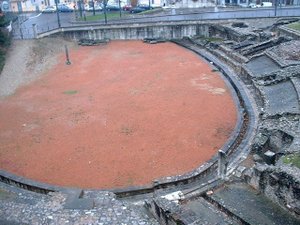
Blandina
Encyclopedia
Martyrdom
In the summer of 177, Irenaeus, bishop of Lyon, witnessed an increasing hostility to Christians in his own city. First they were prohibited from entering public places such as the markets and the baths. Then, when the provincial governor was outside the city, the mob broke loose. Christians were hounded and attacked openly. They were treated as public enemies, assaulted, beaten and stoned. Finally they were dragged into the forum, accused, and, after confessing to being Christians, they were flung in prison. Vettius Epagathus, who tried to intervene at the trial, was shouted down: "The prefect merely asked him if he too was a Christian. When he admitted, in the clearest voice, that he was, the prefect sentenced him to death along with the others." Their servants, tortured to extract information, finally "confessed" that, as the Romans suspected, their Christian employers committed sexual atrocities and cannibalism. An eyewitness account reports that this evidence turned the population against them: "These stories got around, and all the people raged against us, so that even those whose attitude had been moderate before because of their friendship with us now became greatly angry and gnashed their teeth against us" ("Martyrs of Lyons" 9, in Christian Martyrs, 64-5). Every day new victims - the most outspoken members of the churches in Lyons or the neighboring town of Vienne, twenty miles down the Rhone River, were arrested and brutally tortured in prison as they awaited the day set for the mass execution, 1 August. This was a holiday to celebrate the greatness of Rome and the emperor. Such occasions required the governor to display his patriotism by sponsoring lavish public entertainment for the whole population of the city. These obligations burdened provincial officials with enormous expenses for hiring professional gladiators, boxers, wrestling teams, and swordsmen. But the year before, the emperor and the Senate had passed a new law to offset the cost of gladiatorial shows. Now the governor could legally substitute condemned criminals who were non-citizens, offering the spectacle of their torture and execution instead of athletic exhibitions - at the cost of six [aurei] per head, one-tenth of the cost of hiring a fifth class gladiator, with proportionate savings for the higher grades. This consideration no doubt added incentive to the official zeal against Christians, who could provide, as they did in Lyons, the least expensive holiday entertainment.The story of one of the confessors in Lyons, the slave woman Blandina, illustrates what happened:
All of us were in terror; and Blandina's earthly mistress, who was herself among the martyrs in the conflict, was in agony lest because of her bodily weakness she would not be able to make a bold confessor of her faith. Yet Blandina was filled with such power that even those who were taking turns to torture her in every way from dawn to dusk were weary and exhausted. They themselves admitted that they were beaten, that there was nothing further they could do to her, and they were surprised that she was still breathing for her entire body was broken and torn.
On the day set for the gladiatorial games, Blandina, along with three of her companions, Maturus, Sanctus, and Attalus, were led into the amphitheater:

After having run through the gauntlet of whips, having been mauled by animals, and forced into an iron seat placed over a fire to scorch his flesh, Ponticus died. Blandina, having survived the same tortures, was at last tossed into a net and exposed to a bull. After being tossed a good deal by the animal, she no longer perceived what was happening... Thus she too was offered in sacrifice, while the pagans themselves admitted that no woman had ever suffered so much in their experience.
Memory
- Her feast is celebrated 2 June.
- Two communes in FranceFranceThe French Republic , The French Republic , The French Republic , (commonly known as France , is a unitary semi-presidential republic in Western Europe with several overseas territories and islands located on other continents and in the Indian, Pacific, and Atlantic oceans. Metropolitan France...
are named after her. See Sainte-BlandineSainte-BlandineSainte-Blandine is the name of two communes in France, named for Blandina, virgin and martyr:* Sainte-Blandine, in the Isère département* Sainte-Blandine, in the Deux-Sèvres département...
.

